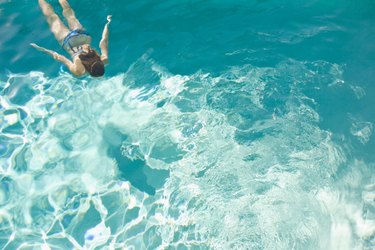
Spend a day at the pool or an hour swimming laps and you feel spent. Water-related tiredness often occurs after a water workout or time passed splashing away in the summer sun. Many reasons exist as to why the body experiences weariness after swimming, everything from aerobic fatigue to water temperature.
It Uses Major Muscle Groups
Video of the Day
Swimming uses all of the major muscle groups and therefore is a demanding exercise that can tire the body. The breastroke, backstroke, butterfly and freestyle engage the abdominals, biceps and triceps, glutes, hamstrings and quadriceps. Other primary muscles used in swimming include the anterior and posterior deltoids, pectorals and trapezius. Because swimming involves major muscle groups, it is important to warm up with a few simple shoulder, arm and leg stretches before doing laps or taking a water aerobics class.
Video of the Day
It Is an Aerobic Exercise
Some people mistake swimming as a nonaerobic exercise, but actually the reverse is true. Aerobic exercise is defined as that which moves large muscle groups continuously for a duration that raises the heart rate. With swimming, large muscle groups in the arms and legs move constantly and so swimming for at least 30 minutes qualifies as aerobic exercise. Keep in mind, however, that due to the bouyancy and cooling effects of water, a swimmer's heart rate will not reach the same level as the heart rate of an exerciser doing the same amount of physical activity on dry land.
It Uses Resistance
Water requires more work to move in, due to resistance. Water provides 12 times the resistance of air, despite its buoyancy. However, the buoyancy of water lessens the stress of gravity's pull on weight-bearing joints. Any stress of movement shifts to the muscles, making swimming both aerobic and anaerobic — and this exercise combination can wear you out.
Other Fatigue Factors
Water temperature affects how you feel after swimming. Cold water can cause muscle strain due to a decrease in blood flow, and also the body must work harder to stay warm. Warm pools tend to increase the body temperature, which may lead to fatigue. Ideal water temperatures for swimming are about 77 to 81 degrees Fahrenheit. The chlorine in pools can affect lungs, resulting in exercise-induced breathing problems and tiredness.